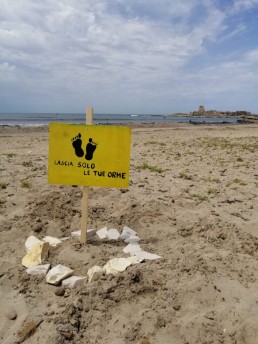(Bad) habits and sustainable tourism
Before the COVID pandemic, In Europe, the tourism industry produced almost 3.7% of EU GDP, with 1.8 million businesses and over 11.3 million jobs. If the allied industries are also taken into account, tourism-related sectors generated around 10% of EU GDP and 11% of the workforce (Eurostat 2018).
The question arises whether it is possible to generate this revenue without, therefore, creating a major impact on the environment.
Sustainability in the tourism sector is so important that the UN declared 2017 as the "International Year of Sustainable Tourism" and included the topic among the goals of the UN 2030 Agenda.
;
Of course, there are many ways to preserve the environment while on holiday and many of them are known and practised by many tourists, such as saving water and energy resources, not polluting, not encroaching on protected areas, respecting prohibitions, preferring local products, etc. etc.
But among the many small habits that we no longer pay attention to, which ones can we use to damage the environment, even unknowingly?
Thinking about the beach, the interface between water and land, how many of us behave in a sustainable manner? And who is aware of laws and regulations that they might break without ever having thought of them before?
Who does not like to pick up seashells while walking and keep them as a souvenir? And yet, shells are made up largely of calcium carbonate, a nutrient that is valuable to the ecosystem because it promotes the stability of the marine environment: it is a substrate for marine plants, acts as protection for algae and crabs and is a material for building birds' nests.
Who would not spend hours watching their dog frolicking on the free beach, perhaps at sunset? Unfortunately, dogs are one of the main causes of nest destruction and predation on the chicks of seabirds nesting in the sand, including the Common Red-backed Rock Thrush, an endangered and protected species under both national hunting and European biodiversity conservation legislation.
Who as a child did not catch a crab, a mollusc or a fish with a net and keep it in a bucket full of water and release it at night? Unfortunately, these little animals will meet a certain death as the temperature of the water in the bucket leads to irreversible damage. Article 544 of the Penal Code states that: "Anyone who cruelly or unnecessarily causes the death of an animal shall be punished by imprisonment from 4 months to 2 years".
;
Who wouldn't prefer to lie in the sun in the dunes, away from the crowds, and perhaps go exploring further into the pine forest, even if only for a bit of refreshment? Who ever thought that doing so might destroy rare plant species and valuable habitats? In fact, dune and backdune environments are part of the protected areas of the Natura 2000 network, an ecological network for the preservation of biodiversity. The Penal Code Art. 733-bis "Destruction or deterioration of habitats within a protected site" states that "Whoever, outside the permitted cases, destroys a habitat within a protected site or in any case deteriorates it, thus compromising its state of conservation, shall be punished with imprisonment of up to eighteen months and a fine of not less than 3,000 euros".
So, reflecting on our (bad) habits, are we sure that sustainable tourism is not easier to achieve than we might think?



